As Ramadan Starts, Iran Prosecutor Wants Action Over Fast Breakers In Cars
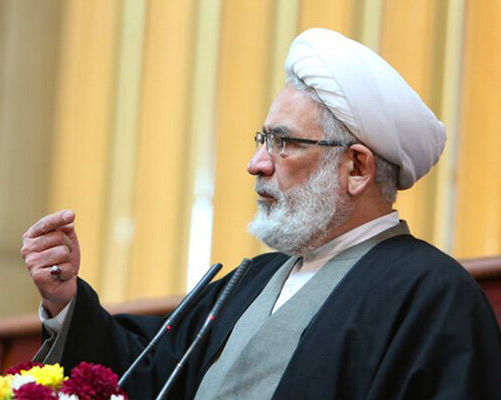
Iran’s prosecutor-general has called on the police to challenge those eating and drinking in their cars during daylight in the fasting month of Ramadan.

Iran’s prosecutor-general has called on the police to challenge those eating and drinking in their cars during daylight in the fasting month of Ramadan.
In a letter to the police commander-in-chief Hossein Ashtari, Mohammad Jafar Montazeri pointed out that vehicles are not private property, meaning that any eating and drinking inside cars in public places should not take place.
Ramadan fasting begins Sunday in Iran. It started Saturday, as expected, in Saudi Arabia, once the Ramadan crescent moon was confirmed Friday. The United Arab Emirates and Kuwait also declared Saturday as the first day of the lunar month.
Montazeri stressed that prosecutors across Iran should cooperate with, and support the police, in following holy month’s rituals and regulations. Foreign minister Hossein Amir-Abdollahian tweeted a wish that the holy month bring “mercy…to us and all peoples with goodness, tranquility and abundance.”
Fewer people have been observing the Muslim fasting period in recent years but police arrest and fine anyone who breaks the rules in public.
In addition to avoiding certain actions mentioned in the Qur'an, Muslims must abstain from food or drink of any kind from dawn to dusk, which will be about 14 hours in Iran this year.
Every year police enforce a national plan to deal with those who break Ramadan rules in public, and transgressors are sometimes sentenced to months of detention and lashes.
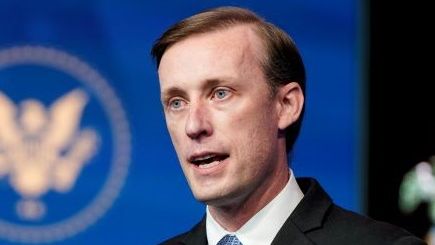
There can be no doubt about President Joe Biden’s commitment to the defense of partners in the Middle East, National Security Advisor Jake Sullivan has said.
In a statement released on Friday by the White House, Sullivan mentioned that as Ramadan approaches, “We welcome the proactive diplomacy underway with our friends and partners across the Middle East region.” He added that these efforts help “President Biden’s agenda of forging a more secure and integrated Middle East region through a combination of deterrence against adversaries and diplomacy wherever possible…”
Sullivan went on to praise the summit held earlier in the week between the United Arab Emirates, Israel, Bahrain and Egypt with the participation of US Secretary of State Antony Blinken, saying the plan is to expand this circle of partners.
He also mentioned sanctions designation this week against a procurement network for Iran’s missile program, adding that “We will continue to use all appropriate authorities to hold Iran and its proxy groups accountable for threats against our friends and partners.”
The statement also highlighted terror attacks in Israel and said, “President Biden spoke with Prime Minister Bennett on Wednesday and offered all appropriate assistance in the wake of these barbarous attacks against innocent civilian. Our entire administration stand behind our Israeli allies as they work to confront threats to their citizens.”
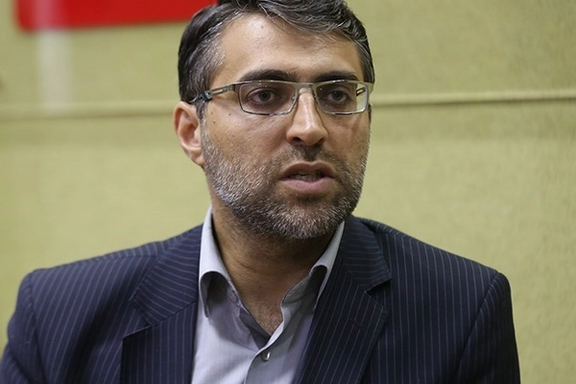
The general director of a major government pension fund in Iran says that around $400 million was lost either through mismanagement or embezzlement.
The official government news agency, IRNA, quoted Hossein Amerian, the newly appointed general director of steel industry pension fund that there are 800 investigations taking place to identify all those who are responsible for the losses.
The fund makes retirement payments to tens of thousands of people who worked both at government-owned and privatized steel companies. When the pension fund loses money, the government must step in and fill the deficit in addition to paying pensions of millions of former government employees such as teachers.
Because of the current economic crisis, triggered mainly by US economic sanctions since 2018, the government has been unable to regularly dispense the monthly pensions or adequately increase payments amid a 40-percent annual inflation rate.
Amerian explained that fund managers in the previous government of president Hassan Rouhani invested in money-losing government companies or simply engaged in corrupt practices that cost the pension fund 100 trillion Iranian rials or $400 million.
Officials appointed by President Ebrahim Raisi in recent months have claimed many cases of corruption by former managers, but it is not clear to what extent these are politically motivated. There have also been allegations of nepotism in the new administration, where newly appointed officials want to fire thousands of managers to appoint their own friends and relatives to lucrative posts.
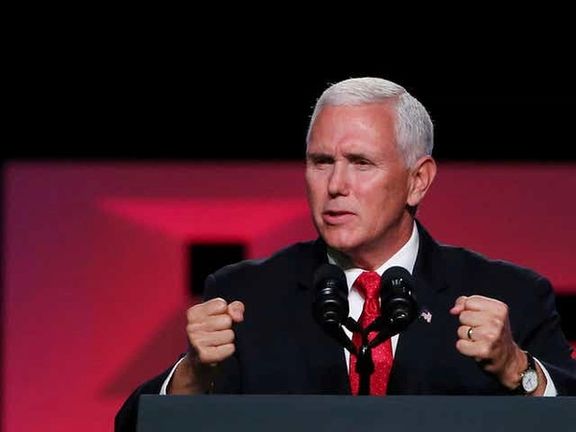
Former United States vice-President Mike Pence has linked criticism of the Biden administration over the Russian invasion of Ukraine to world powers’ nuclear talks with Iran.
“it’s incomprehensible to the American people that we are negotiating with Iran to lift sanctions, presumably to buy more oil,” Pence told Fox News Friday. The former vice-President backed refusing Russian oil and gas, while suggesting the US facing rising prices should neither use reserves nor consider imports from Iran or Venezuela.
Pence denounced year-long negotiations, including Russia as one of five world powers, to revive the 2015 Iran nuclear deal, which the US left in 2018 with Pence as vice-president under Donald Trump. Pence said the talks emboldened Putin over Ukraine.
“It’s only with American strength and rallying our Western allies that we’ll be able to return peace to Ukraine,” Pence argued. He rejected “working with Russia to try and convince Iran to get back in the nuclear deal.”
Pence criticized Biden’s move to release 1 million barrels of oil a day over six months from reserves to decrease prices, suggesting there were options to raise production. “These are the kind of messages of weakness the American people aren’t having,” he said. “American strength is the antidote to this moment at home and abroad.”
He attacked Biden for sending a “delegation to Venezuela, to the dictator [President Nicolas] Maduro, to presumably begin to beg for more oil when we have vast reserves of oil in this country.”
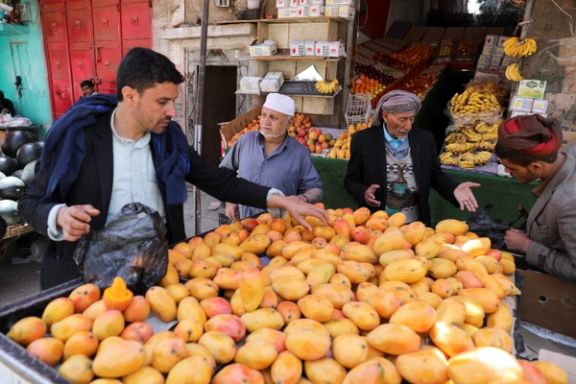
Iran has welcomed a two-month truce between Iran-backed Houthis of Yemen and a Saudi-led coalition fighting the rebel force for seven years.
Iran’s Foreign Ministry Spokesman Saeed Khatibzadeh in a statement Saturday expressed hope that the ceasefire could be "a prelude to the complete lifting of the siege on Yemen" and the "establishment of a permanent truce" which could help find a "political solution to the crisis", and lead to "complete exchange of prisoners" between the warring sides.
This is a major breakthrough as the warring sides in Yemen's conflict have agreed to a two-month nationwide truce. The Yemeni conflict is widely seen in the region as a proxy war between Saudi Arabia and Iran.
The United States and others have criticized Iran for supplying missiles, drones and other weapons to the Houthis as part of its drive for regional influence and attempts to weaken Saudi Arabia. At the same time Tehran is asking Washington to lift sanctions imposed on its Revolutionary Guard that is managing proxy forces in the Middle East.
It is reasonable to assume that without Tehran’s agreement the Houthis would not have accepted a ceasefire with Riyadh.
The truce will allow fuel ships to enter Hodeidah port controlled by Houthis and for scheduled commercial flights to operate from the airport in the capital Sana’a to other countries in the region. The parties have also agreed to discuss opening roads in Ta’izz and other Yemeni provinces.
UN special envoy Hans Grundberg said Friday that ceasefire would come into effectahead of the holy month of Ramadhan at 7:00 PM local time (1600 GMT) and could be renewed if the involved parties agreed.
"The aim of this Truce is to give Yemenis a necessary break from violence, relief from the humanitarian suffering and most importantly hope that an end to this conflict is possible," Grundberg said in a statement Friday, adding he would press for a permanent ceasefire.
UN Secretary-General Antonio Guterres has also expressed hope that the truce could be "a first step to ending Yemen's devastating war" and urged the Houthis, also known as Ansarullah, and the Saudi-led coalition to resume an "inclusive and comprehensive Yemeni political process."
Houthis said Wednesday halting military operations for the month of Ramadan, announced by the coalition, was “meaningless” if the siege against the rebels continued to be in full effect.
The coalition's ceasefire came only days after Houthis launched multiple drone and missile attack on Saudi oil giant Aramco's petroleum products distribution station in Jeddah on March 25, presumably as behind the scenes talks were taking place.
The United States, its Western allies, and others blame Iran-supllied drones and missiles for attacks by Houthis on Saudi and Emirati energy facilities.
In mid-March in response to possible Saudi-based Gulf Cooperation Council (GCC) plans to invite Yemeni parties including the Houthis for consultations in Riyadh, the Iran-backed Ansarullah said they welcomed talks only if the venue was a neutral country.
The coalition that includes Saudi Arabia's regional allies including the United Arab Emirates (UAE) has been at war against the Houthis since 2015 in support of the internationally recognized President Abdrabbuh Mansur Hadi. The Houthis ousted Hadi in late 2014 for what they said was corruption.
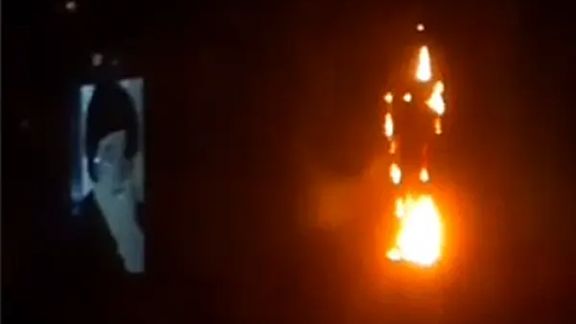
A senior cleric in Qom expressed anger over unknown people setting fire to a statue of the founder of the Islamic Republic, Ruhollah Khomeini in the city.
A video of a Khomeini’s statue in flames was circulated on social media in recent days, prompting Qom Friday Prayers leader Alireza Arafi to condemn the act and threaten those behind it.
He described it as "vicious" and said security officials would definitely follow up on this issue. He called it as part of a chain of conspiracies that are aimed at undermining the Islamic Republic.
Qom – along with Mashhad, is the most religious city in Iran, home to the largest Shiite seminary and many hardliner clerics.
As poverty is soaring in Iran and the regime keeps failing to deliver on its promises, such acts of political vandalism are growing across the country.
In February, another statue of Khomeini in the city of Ardestan in the province of Esfahan was destroyed, several days before a recorded message against Khomeini and Supreme Leader Ali Khamenei was broadcast on the public announcement system in Mashhad’s bazaar.
In January, a memorial statue of Qasem Soleimani, the commander of Iran’s Revolutionary Guard Qods Force, was set on fire in the central city of Shahrekord hours after it was erected.
According to a new online survey by a Netherlands-based institute, over 60 percent of Iranians want regime change or "transition from the Islamic Republic".